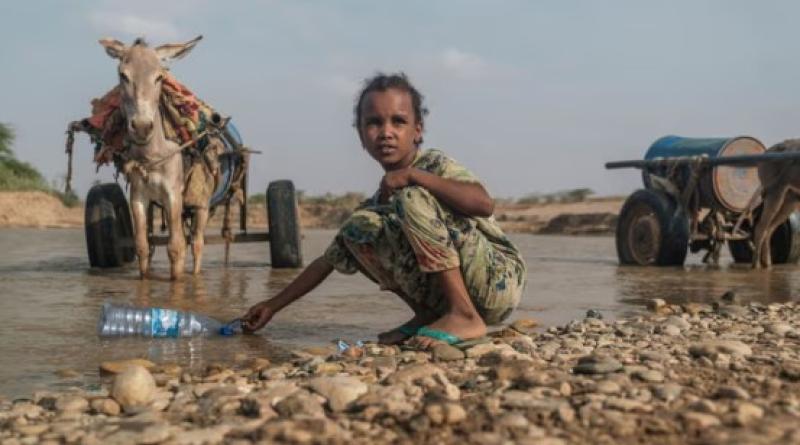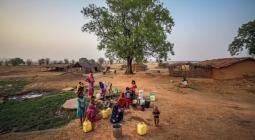‘Paying in lives’: health of billions at risk from global heating, warns report

Inaction on the climate crisis is ‘costing lives and livelihoods’ due to extreme heat, food insecurity and infectious diseases, say scientists
The climate crisis will have a catastrophic effect on the health and survival of billions of people unless the world acts to reduce global heating, according to a leading report that warns that heat-related deaths are soaring, dangerous bacteria are spreading along coasts, and economies are being hit as people struggle to work and food production shrinks.
The eighth annual report on health and climate change from the Lancet Countdown team shows that little account has been taken of past warnings. The world, it says, is “moving in the wrong direction”, and strongly criticises continuing investment in fossil fuels.
The report comes as Cop28 prepares to hold its first Health Day, focused on the links between the climate crisis and human health.
The report says that 127 million more people were experiencing moderate or severe food insecurity in 2021, compared with the previous three decades, putting them at risk of malnutrition and irreversible health harm. Life-threatening diseases are spreading, including dengue, malaria and West Nile virus. Warmer seas have led to the coastal spread of the water-borne vibrio bacteria at the rate of an extra 204 miles (329km) a year since 1982, putting 1.4 billion people at risk of diarrhoeal disease, severe wound infections and sepsis. Exposure to air pollution - which is worsened by heatwaves – is increasing the risk of respiratory and cardiovascular disease, cancer, diabetes, neurological disorders, and adverse pregnancy outcomes.
Heat-related deaths among over-65s, who are more vulnerable, are up by 85% since the 1990s. Without the increase in global temperatures, such deaths would have increased as the population enlarges, but only by 38%. The highest global temperatures in more than 100,000 years were recorded in 2023, says the report.
Even at the current 10-year mean heating of 1.14C above pre-industrial levels, there is a profound impact on the lives and health of people around the world. But, say the 114 experts from 52 research institutions and UN agencies, what we are seeing could just be early symptoms of the disaster to come.
“Our health stocktake reveals that the growing hazards of climate change are costing lives and livelihoods worldwide today. Projections of a 2C hotter world reveal a dangerous future, and are a grim reminder that the pace and scale of mitigation efforts seen so far have been woefully inadequate to safeguard people’s health and safety,” said Dr Marina Romanello, executive director of the Lancet Countdown at University College London.
“There is an enormous human cost to inaction, and we can’t afford this level of disengagement – we are paying in lives. Every moment we delay makes the path to a livable future more difficult and adaptation increasingly costly and challenging.”
The value of economic losses resulting from extreme weather events was estimated at $264bn (£215bn) in 2022, 23% higher than in 2010-14.
If temperatures rise by 2C, heat-related deaths will increase by 370% and the number of work hours lost will be up by 50% by mid-century, according to new projections from the Climate Vulnerable Forum of countries most at risk. By 2041-60, about 525 million people could be experiencing moderate to severe food insecurity, risking malnutrition.
UN secretary-general António Guterres said there was no excuse for delay. “We are already seeing a human catastrophe unfolding, with the health and livelihoods of billions across the world endangered by record-breaking heat, crop-failing droughts, rising levels of hunger, growing infectious disease outbreaks and deadly storms and floods,” he said.
Dr Georgiana Gordon-Strachan, director of the Lancet Countdown regional centre for Small Island Developing States criticised rich nations for breaking their pledge to deliver $100bn a year to help vulnerable countries cope with the climate crisis.
“We’re facing a crisis on top of a crisis,” she said. “People living in poorer countries, who are often least responsible for greenhouse gas emissions, are bearing the brunt of the health impacts, but are least able to access funding and technical capacity to adapt to the deadly storms, rising seas and crop-withering droughts worsened by global heating.”
Investment, lending and government incentives for fossil fuel expansion is increasing, says the report.
There are, however, some signs of progress, says the report. Deaths from fossil fuel-derived air pollution have fallen 16% since 2005, with 80% of this decline owing to efforts to reduce pollution from coal burning. Global investment in clean energy grew 15% in 2022 to $1.6tn, exceeding fossil fuel investment by 61%. In 2022, 90% of the growth in electricity capacity was down to renewable energy.
Photograph: Eduardo Soteras/AFP/Getty Images





